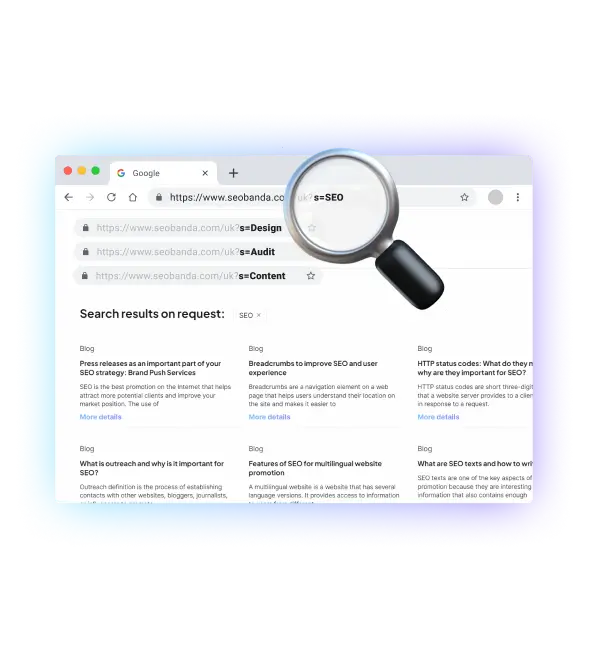What is a dynamic URL and its impact on SEO
A dynamic URL (Uniform Resource Locator) is a web address that changes depending on the user’s request or specific parameters. It differs from a static URL in that it can include variable parts that allow you to generate different content based on dynamic requests. For example: https://www.seobanda.com/?s=SEO. Here, “?s=SEO” defines the query in the search bar.



Where are dynamic URLs used?
- Online stores and e-commerce: Dynamic URLs allow you to implement sorting on your website (by price, title, etc.). This makes your online store more convenient for users and increases their opinion of your company.
- Search engines: When you enter a query in the search box, it generates a dynamic URL that directly depends on the query.
- Pagination: Dynamic URLs are used to create links to subsequent pages of results or articles, for example, https://www.seobanda.com/blog/page/2/.
- Social media profiles: Dynamic URLs can be used to access user profiles or specific pages.
- Booking systems: Dynamic URLs are often used on hotel, ticket, or other service booking sites where URL parameters can indicate the choice of date, service type, number of people, etc.


How do Dynamic URLs work?
- Request from the user
- When a user enters a dynamic URL in a browser or clicks on a link, the browser sends an HTTP request to the web server. A dynamic URL can contain parameters in the request string that determine what kind of content should be provided.
- Processing of the Request on the Server
- On the server, the request is processed by a special server script or program. Depending on the URL parameters, the server performs various actions:
- Retrieving data: The server can use URL parameters to retrieve information from the database. For example, ?s=SEO means searching for the SEO keyword on the SEObanda website.
- Content generation: Based on the data retrieved, the server can generate an HTML page that contains information about the product, including its name, description, images, and prices.
- On the server, the request is processed by a special server script or program. Depending on the URL parameters, the server performs various actions:
- Response generation.
- After processing the request and generating the content, the server creates an HTML page that includes the relevant data. This page is sent back to the user’s browser.
- Displaying the Content
- The browser receives the HTML code from the server and displays it on the user’s screen. The user sees the result of the request in the form of a web page with the information that the server generated based on the dynamic URL.

Increase visibility
for your business: SEO solution for growth!


How do dynamic urls affect SEO?

Indexing
- Complicated indexing: Dynamic URLs often contain numerous parameters that can make the indexing process more difficult for search engines. For example, a URL with parameters like “?id=123&category=456” is harder to process than a static URL like “our-services/design/”.
- Repetitive content: If the same content is available through different combinations of parameters, it can lead to duplicate content issues. This can lead to search engine penalties and indexing issues.
Relevance and readability
- URL readability: Dynamic URLs often contain parameters that make URLs long and less understandable. Search engines and users prefer clean and clear URLs.
- Descriptiveness: URLs that contain descriptive and keywords are usually preferred over those that consist of random parameters. For example, “our-services/design/” will be clearer and more useful for SEO than “?id=123&category=456”.
Problems with duplication
- Canonical URLs: It is important to use canonical URLs to indicate to search engines which version of the page is the primary version to avoid duplicate content issues. This is almost impossible for pages with dynamic URLs.
Keywords and optimization
- Keywords in the URL: Dynamic URLs usually contain parameters that may not be optimized for keywords. Static URLs that contain relevant keywords are usually better for SEO and rank higher.
- Human-readable URLs: Using CNC, where URL parameters are converted into understandable and keywords, can help improve SEO. This makes URLs clearer and more useful for both search engines and users.
Impact on Loading Speed
- Loading speed: Dynamic URLs may require additional processing and content generation on the server, which can affect page load speed. Slow pages have a negative impact on search engine rankings.


Benefits of dynamic URLs for SEO
Personalization: Dynamic URLs make it easy to adapt content based on query parameters, which can improve relevance and personalization for users. For example, parameters can be used to show different variants of products or articles based on user preferences.
Scalability: Dynamic URLs allow you to efficiently manage a large amount of content without having to create separate static pages for each variant. This is especially useful for sites with large product catalogs or a large number of articles.
Dynamic generation: Dynamic URLs can include keywords in the parameters, which helps to target specific search queries. For example, “example.com/products?category=shoes&brand=nike” can help with optimization for brand and category-specific queries.
Parameters for filtering: Dynamic URLs allow users to filter and sort content on a site, which can improve the user experience. For example, filtering products by price or rating can lead to an increase in time spent on the site and a decrease in bounce rate.
Parameter tracking: Dynamic URLs make it easy to track the performance of different campaigns or parameters by loading specific content. This can help in analytics to understand which parameters and keywords lead to the best results.
Automation of updates: Using dynamic URLs allows you to automatically update content based on data from the database. This can ensure that information is accurate and up-to-date without having to manually update each page.
Speed of implementation: Creating new pages or sections of content can be faster with dynamic URLs, especially when these pages are created automatically based on existing templates.

Increase visibility
for your business: SEO solution for growth!


Recommendations for optimizing dynamic URLs for SEO
- Use clear URLs: If possible, convert dynamic URLs into more readable and understandable versions. For example, instead of example.com/product?id=1234, use example.com/product/nike-air-max.
- Canonical URLs: Use canonical URLs to avoid duplicate content issues.
- Optimize parameters: Limit the number of parameters in URLs and use them only for really important functions.
- Caching: Set up efficient caching to improve loading speeds.
Dynamic URLs can be a powerful SEO tool if used and optimized properly, providing both user experience and search engine performance.


Conclusion
A dynamic URL is a page address that can change depending on the user’s request. It can be convenient for people to get exactly the information they want to see, and it also allows you to avoid creating a large number of static pages.
Dynamic URLs often have a negative impact on SEO, but if done correctly and optimized, they can help improve rankings and increase conversions.
You may also like it

Brand identity: The key to brand recognition and SEO success
Every product has its own unique feature that sets it apart from other brands. It could be a special font, a unique mascot, or an interesting logo with the right...

Press releases as an important part of your SEO strategy: Brand Push Services
SEO is the best promotion on the Internet that helps attract more potential clients and improve your market position. The use of press releases is an important SEO...












